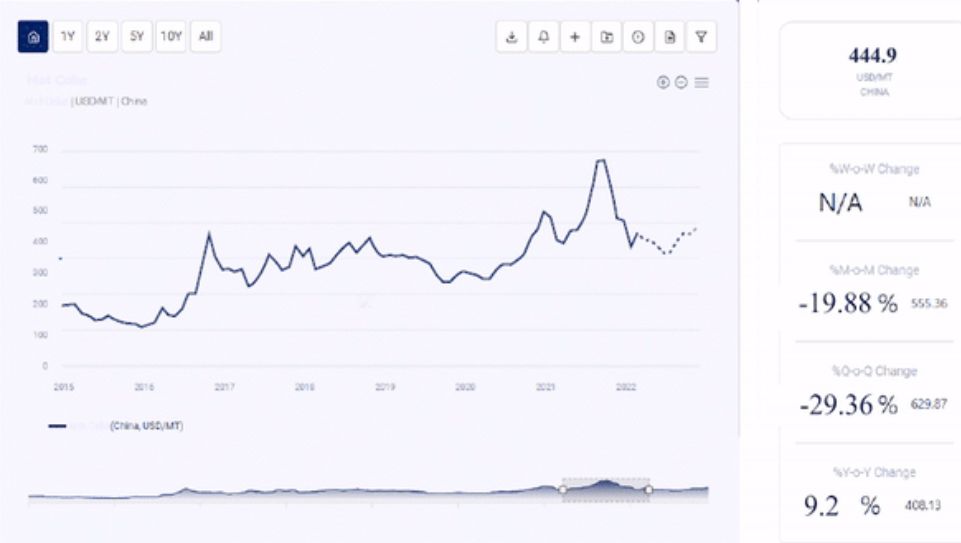Maleic Acid Prices: Historical Chart Analysis, Trends, and Forecasts by Procurement Resource
In Asia for Q1 2023, maleic acid prices rose due to increased feedstock maleic anhydride costs and disrupted supply chains. The Lunar New Year holiday and growing intercontinental demand further supported the trend. However, Q2 saw a sharp price decline due to economic fluctuations and decreased end-user demand, coupled with constrained supply. In Europe, Q1 and Q2 experienced consistent maleic acid price declines attributed to lowered feedstock costs, rising inflation, and energy expenses impacting industrial outlook. Labor strikes and logistical disruptions also contributed to the price dip. Similarly, North America's maleic acid prices dropped due to weak operational rates, interrupted supply chains, financial crises, and inadequate upstream sector support in both quarters.
Request for Real-Time Maleic Acid Prices: https://www.procurementresource.com/resource-center/maleic-acid-price-trends/pricerequest
Definition
Maleic acid is a dicarboxylic organic compound with the chemical formula C4H4O4. It exists as white crystals, readily soluble in water. Maleic acid exhibits geometric isomerism with its cis and trans forms. It possesses a sharp, sour taste and is commonly used in the production of other chemicals and materials due to its ability to undergo various reactions. Its applications span industries like chemicals, polymers, coatings, and pharmaceuticals, where its properties contribute to diverse chemical processes and product formulations.
Key Details About the Maleic Acid Price Trends:
Maleic acid, a key ingredient used in various industries like agriculture, pharmaceuticals, and polymer manufacturing, has price trends influenced by several factors. Here are some key details about these trends:
Supply and Demand: The balance between supply and demand significantly influences maleic acid prices. Increases in demand from industries such as resins, coatings, and additives can drive up prices, especially if supply is constrained due to production issues or raw material shortages.
Raw Material Costs: Maleic acid is produced from benzene and butane, so fluctuations in the prices of these raw materials can directly impact maleic acid prices. For instance, changes in oil prices, which affect benzene and butane costs, can lead to corresponding changes in maleic acid pricing.
Geopolitical Factors: Trade policies, tariffs, and geopolitical tensions that affect global trade routes can impact the availability and cost of maleic acid. For example, import/export restrictions between major producing and consuming countries can alter price dynamics.
Production Technology: Advances in production technology or shifts towards more efficient or sustainable production methods can also influence maleic acid prices by reducing production costs or increasing output.
Market Sentiments: Speculative activities and market sentiments based on forecasts of future demand and supply also play a role in shaping price trends.
Regulatory Changes: Environmental regulations can affect the production methods and capacity for maleic acid, influencing costs and, subsequently, prices.
To get the most current and detailed analysis, industry-specific reports and market analysis platforms provide updated data and forecasts on maleic acid price trends.
Industrial Uses Impacting the Maleic Acid Price Trends:
 Maleic acid, a versatile organic compound, has several industrial applications that impact its price trends. Let's explore some of these uses and how they influence its market price:
Maleic acid, a versatile organic compound, has several industrial applications that impact its price trends. Let's explore some of these uses and how they influence its market price:
Resin Production: Maleic acid is a key component in the production of unsaturated polyester resins (UPR), which are widely used in the manufacture of fiberglass, automotive parts, and marine equipment. Demand for these resins directly affects the demand and price of maleic acid.
Agricultural Chemicals: It's used in the synthesis of agricultural chemicals, including pesticides and herbicides. Fluctuations in the agricultural sector, driven by seasonal demands or regulatory changes, can impact the price of maleic acid.
Pharmaceuticals: In the pharmaceutical industry, maleic acid is used to manufacture active pharmaceutical ingredients (APIs) and excipients. The expansion of the healthcare sector and increased demand for medications can lead to increased consumption of maleic acid, thus influencing its price.
Food and Beverage: Maleic acid finds applications as an acidulant in food and beverages, affecting taste, preservation, and pH stabilization. Trends in consumer preferences and regulatory standards in food safety can affect the demand and price dynamics.
Coatings and Adhesives: It is used in coatings and adhesives, particularly in water-soluble paints and wallpaper adhesives. Economic factors affecting construction and renovation industries can influence maleic acid prices.
Global Supply Chain and Production Costs: The availability of raw materials (primarily benzene and butane), energy costs, and logistical aspects also significantly influence the price of maleic acid. Disruptions in supply chains or changes in energy prices can have immediate effects on its pricing.
These varied applications mean that maleic acid's price is sensitive to shifts in different sectors and the broader economic environment.
Key Players:
- Bartek Ingredients Inc
- Fuso Chemical Co Ltd
- Thirumalai Chemicals Ltd
- Yongsan Chemicals
- Prinova Group LLC
- Guangzhou ZIO Chemical Co Ltd
About Us:
Procurement Resource stands as a comprehensive, cost-effective hub for market research across more than 500 chemicals, commodities, and utilities. Our team of seasoned analysts conducts extensive research, providing clients with up-to-the-minute market reports, cost models, price analyses, and category insights, essential for streamlining the procurement process. We deliver the latest data on pricing and production costs, ensuring accuracy and consistency for a wide range of goods and commodities. Collaborating with procurement teams across diverse industries, Procurement Resource equips clients with real-time insights, pioneering industry practices, and an understanding of procurement methods and supply chains. This empowers them to craft growth strategies rooted in current trends and optimized for success.
Contact Us:
Company Name: Procurement Resource
Contact Person: Chris Byrd
Email: sales@procurementresource.com
Toll-Free Number: USA & Canada – Phone no: +1 307 363 1045 | UK – Phone no: +44 7537 132103 | Asia-Pacific (APAC) – Phone no: +91 1203185500
Address: 30 North Gould Street, Sheridan, WY 82801, USA

Comments
Post a Comment